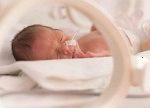
Our partnership with AstraZeneca is part of the EFCNI’s ongoing dedication to raising awareness amongst parents and healthcare professionals about the symptoms of RSV infection and how it can be prevented.

Image provided by AstraZeneca
With around 33 million acute lower respiratory infections caused each year, RSV infection is one of the most common causes of early life wheezing illness.[1,2] Babies who are born prematurely or who have underlying health issues such as heart or lung disease have a greater risk of getting a more serious RSV infection.[2,3] This means that recognising the symptoms of RSV infection, particularly in babies who are at high risk, is crucial in ensuring that these babies can receive the right care.
To support with this, our Premium Platinum Partner AstraZeneca has produced and funded the Sounds of RSV, and the EFCNI spoke to Laura Roth, Global Commercial Head, Vaccines and Immune Therapies at AstraZeneca to learn more about it:

© Laura Roth
Laura Roth: When you see statistics such as approximately 45% of hospital admissions and in-hospital deaths due to RSV infection occurring in children younger than 6 months[4], it’s clear that further action is required to alleviate the burden of this virus, particularly amongst those infants who are at risk.
This is something we’re strongly committed to at AstraZeneca as part of our wider work in giving parents and caregivers support through education and awareness-raising.
As part of this, we wanted to help people better understand what RSV infection symptoms could actually sound like in practice. So that if you heard similar symptoms from your baby (particularly if they are at risk – for example, if they were born premature or have lung or heart diseases), you could contact your doctor, or if you’re pregnant you know what to look out for when your baby is born.
That’s why we developed Sounds of RSV, which allow you to hear what some of the symptoms can sound like, so you can recognise them easily. We were delighted to then work with the EFCNI to use the Sounds of RSV in their informative #LittleLungs animation.
The first symptoms of RSV infection may be:
- Congestion in the nose
- Fever
- Wet and forceful cough
More severe RSV symptoms may be:
- Wheezing or fast breathing
- Bluish skin colour
- Caving in of the chest at the ribs (retractions)
- Spreading of the nostrils with every breath (nasal flaring)
If you hear or see severe RSV infection symptoms starting in your baby, or if you have any other worries about their health, it’s important that you contact a doctor without delay.
Following the COVID-19 pandemic, there is a greater sense of understanding around the impact of respiratory infectious diseases and the importance of preventing them. We hope that our Sounds of RSV will contribute to this growing awareness for one of the less well-known respiratory infections, which can nonetheless pose a significant threat to infants.
It forms part of our efforts every day to tackle RSV infection, and AstraZeneca will continue working to provide resources and support to everyone who could be affected – so that the Sounds of RSV become less and less common for babies around the world.
References:
- You Li. E al,. Global, regional, and national disease burden estimates of acute lower respiratory infections due to respiratory syncytial virus in children younger than 5 years in 2019: a systematic analysis [Internet]. Vol. 399. The Lancet; 2022. Available from: https://www.thelancet.com/journals/lancet/article/PIIS0140-6736(22)00478-0/fulltext
- Piedimonte G, Perez MK. Respiratory syncytial virus infection and bronchiolitis. Pediatr Rev. 2014;35(12):519-530. doi:10.1542/pir.35-12-519.
- Goldstein M, Phillips R, DeVincenzo JP, et al. National Perinatal Association 2018 Respiratory Syncytial Virus (RSV) Prevention Clinical Practice Guideline: an evidence-based interdisciplinary collaboration. Neonatology Today. 2017;12:1-27
- Shi T., et al. Global, regional, and national disease burden estimates of acute lower respiratory infections due to respiratory syncytial virus in young children in 2015: a systematic review and modelling study. Lancet. 2017; 390 (10098): 946-958.


